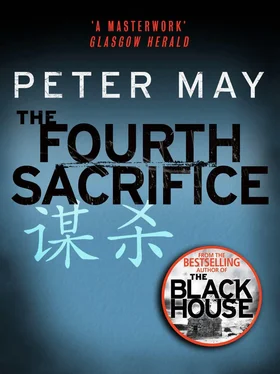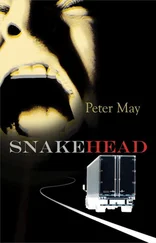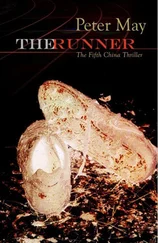Peter May - The Fourth Sacrifice
Здесь есть возможность читать онлайн «Peter May - The Fourth Sacrifice» весь текст электронной книги совершенно бесплатно (целиком полную версию без сокращений). В некоторых случаях можно слушать аудио, скачать через торрент в формате fb2 и присутствует краткое содержание. Год выпуска: 2012, Издательство: Quercus, Жанр: Триллер, на английском языке. Описание произведения, (предисловие) а так же отзывы посетителей доступны на портале библиотеки ЛибКат.
- Название:The Fourth Sacrifice
- Автор:
- Издательство:Quercus
- Жанр:
- Год:2012
- ISBN:нет данных
- Рейтинг книги:4 / 5. Голосов: 1
-
Избранное:Добавить в избранное
- Отзывы:
-
Ваша оценка:
- 80
- 1
- 2
- 3
- 4
- 5
The Fourth Sacrifice: краткое содержание, описание и аннотация
Предлагаем к чтению аннотацию, описание, краткое содержание или предисловие (зависит от того, что написал сам автор книги «The Fourth Sacrifice»). Если вы не нашли необходимую информацию о книге — напишите в комментариях, мы постараемся отыскать её.
The Fourth Sacrifice — читать онлайн бесплатно полную книгу (весь текст) целиком
Ниже представлен текст книги, разбитый по страницам. Система сохранения места последней прочитанной страницы, позволяет с удобством читать онлайн бесплатно книгу «The Fourth Sacrifice», без необходимости каждый раз заново искать на чём Вы остановились. Поставьте закладку, и сможете в любой момент перейти на страницу, на которой закончили чтение.
Интервал:
Закладка:
‘The Underground City.’
She frowned. ‘What’s that?’
‘In the sixties,’ he said, ‘when Mao fell out with Stalin, he thought the Russians were going to drop atomic bombs on Beijing. So he encouraged the population to dig tunnels and shelters under the city. Over ten years, working in their spare time, and with whatever tools they had, the people dug hundreds of kilometres of tunnels and dozens of shelters. Below us right here, there are about thirty-two kilometres of tunnels running in all directions.’ He snorted. ‘But it’s just as well the Russians didn’t bomb us. The tunnels aren’t nearly deep enough. They would have been worse than useless.’
‘So why’s it called the Underground City?’
‘Because the Chinese people are very practical.’ Li swerved to avoid a boy on a bicycle who careered out of a side street without looking. He blasted his horn. ‘Since they had dug out all that space down there, they thought they might as well make use of it. So now there are shops and warehouses, even a one-hundred-bed hotel. The views are not very good, but it is cheap, and at least you get away from the traffic.’ He blasted his horn again, this time at a delivery truck blocking the way. As he edged past it he said, ‘The dealer in reproduction artefacts that we want to speak to has a shop down there.’
A column of primary school children wearing royal-blue trousers and tunics with white shirts and red scarfs marched in ragged single file towards them. They shouted and waved, smiling at Margaret when they saw her in the Jeep. ‘Hello,’ they shouted. ‘Pleased to see you.’
She waved back. ‘An incredible number of these kids speak English,’ she said. ‘It was the same in Xi’an.’ She had mentioned Xi’an without thinking and wished immediately that she hadn’t.
But Li appeared unconcerned. ‘Children are being taught to speak English in all the schools,’ he said. ‘All over China. Soon they will speak three languages. The local dialect, which is the one they grow up with, then Mandarin, then English.’
They pulled up outside a white-tile building with a passageway leading through to a school yard from which children were wandering in and out. At the west side of the building, adjoining an old single-storey block, stood a dusty doorway built in the traditional style, with pillars and crossbeams supporting a sloping green tiled roof. An ornately painted fascia was almost obscured by grime. Dozens of bicycles were parked against the wall on either side of it.
‘This is it?’ Margaret said as they climbed out of the Jeep. ‘The entrance to the Underground City?’
Li shrugged. ‘One of them. My uncle once told me there are about ninety entrances to this particular complex, some of them in shops, others in people’s homes. They say there are many tunnels and entrances the authorities do not even know about.’
As they approached the entrance, Detective Sang stepped out to meet them. He rattled off something quickly in Chinese to Li, and then turned politely to Margaret. ‘This way, please. You follow me.’
In a plain room with scarred, green-painted walls, a young man looked up briefly from his paper as Li, Sang and Margaret passed through from the street. There was nothing unusual about the sight of foreigners here. Up to five hundred of them a day paid to see the Underground City. A staircase with red handrails and paint peeling from the walls led down into the tunnel complex below. The smell of damp, fetid air rose to greet them, and Margaret felt the cold, clammy touch of it on her skin and in her clothes. The tunnels were arched and stippled with white plaster stained by dirt and damp. Fluorescent tubes hung at intervals from a single electric cable running the length of the ceiling. On a concrete ledge, the tools and paraphernalia of the workers who had dug the tunnels were laid out like exhibits in a museum: a broken-handled pickaxe, a knife with a wooden handle, a shovel, three tin mugs, a lunch box. They took a right turn, and in the distance, through several arched supports, they saw an illuminated red map of the tunnel complex beneath a green sign that read ‘beijing air raidshel ter’. An incongruous group of Scandinavian tourists sat on hard seats listening to a lecture on the history of the complex given by a bored-looking Chinese guide.
Sang led them through the group and they turned left along a stretch of tunnel where the supports had been painted a fresh, bright red, and the walls were covered with hand-painted murals. Inset, below two spotlights, was a white bust of Mao Zedong set against a red background. Almost within touching distance, ironically, stood a Buddhist shrine. Marble statues of women riding lions lined the final stretch of tunnel leading to a huge, brightly lit emporium of tourist junk: everything from jade Buddhas and silk dressing gowns to scroll paintings and imitation Ming vases. Attendants raised hopeful eyes as they entered, and then lost interest immediately they saw Li’s uniform. Red lanterns hung from a high arched roof above fluorescently lit glass display cabinets and rack upon rack of silkware.
The visitors passed a tunnel that led off into a dark, misty gloom, and Margaret shivered as she felt the cold breath of it billowing into the comparative warmth of the shop. She saw a sign with an arrow. In both Chinese and English it said, To the Station . But she had no desire to venture into the dark abandoned network of tunnels that ran on deep into the icy bowels of the city, and was relieved when Sang led them through a doorway into a long, narrow shop displaying all manner of reproduction artefacts in tiered glass cabinets. This was, she thought, an extraordinary place. Unless you had prior knowledge, you would have no inkling of its existence from the streets above.
A small, shiny, round-faced man with his hair scraped across his bald head from a parting above his ear, came forward to meet them. There was an exchange of Chinese, then Li turned to Margaret. ‘Mr Ling tells us he speaks English.’
‘Just little, just little,’ Mr Ling said, beaming at Margaret. ‘No get much practice.’ He shrugged his shoulders in theatrical apology.
Li said, ‘You told Detective Sang that you sold a bronze reproduction sword about three months ago to a man asking for a very specific kind of weapon.’
‘Sure,’ said Mr Ling. ‘Usually we sell sword for ceremonial purpose, or maybe for wu shu . But this man, he want real bronze sword, like real artefact. Of course, I have no sword like this. But I tell him I can arrange have one made for him. Only, it ve-ery expensive, and it take time.’
‘Did you ask him what he wanted the sword for?’ Margaret asked.
‘Sure, I ask,’ said Mr Ling. ‘He say sword for exhibition.’
‘And he gave you exact measurements?’ Li said.
‘Sure. I don’t remember exactly now, but Mistah Mao in Xi’an, he will still have mould.’
‘Mr Mao?’ Li asked.
‘Mistah Mao Ming Fu of the Xi’an Craft Artistic Products Factory. He ve-ery clever man. He restore bronze chariot found with Terracotta Warrior.’
Li turned to Margaret and with a slight tone said, ‘Of course, you will have seen the bronze chariots at Xi’an.’
‘Of course,’ Margaret said. She addressed herself to Mr Ling. ‘What kind of measurements did he ask for?’
‘Oh, you know. Length. I think one metre maybe for sword. Maybe little less. And he want handle some certain length. And wood. He want wood handle. And he want the weight just so.’ He moved his hands up and down as if weighing an invisible sword. ‘And, you know, this sword he want in style of Warring States period. Mistah Mao make ve-ery good job. He charge only one thousand yuan. Ve-ery good price.’ He grinned. ‘So I make a little on top.’
Читать дальшеИнтервал:
Закладка:
Похожие книги на «The Fourth Sacrifice»
Представляем Вашему вниманию похожие книги на «The Fourth Sacrifice» списком для выбора. Мы отобрали схожую по названию и смыслу литературу в надежде предоставить читателям больше вариантов отыскать новые, интересные, ещё непрочитанные произведения.
Обсуждение, отзывы о книге «The Fourth Sacrifice» и просто собственные мнения читателей. Оставьте ваши комментарии, напишите, что Вы думаете о произведении, его смысле или главных героях. Укажите что конкретно понравилось, а что нет, и почему Вы так считаете.












